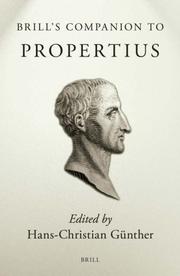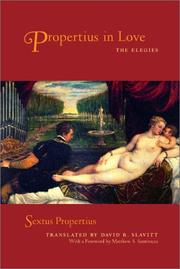| Listing 1 - 6 of 6 |
Sort by
|

ISBN: 9004136827 9789004136823 9786611384227 1281384224 9047404831 9789047404835 9781281384225 6611384227 Year: 2006 Publisher: Leiden ; Boston : Brill,
Abstract | Keywords | Export | Availability | Bookmark
 Loading...
Loading...Choose an application
- Reference Manager
- EndNote
- RefWorks (Direct export to RefWorks)
The present volume provides a comprehensive guide to one of the most difficult authors of classical antiquity. All the major aspects of Propertius' work, its themes, the poetical technique, its sources and models, as well as the history of Propertian scholarship and the vexed problems of textual criticism, are dealt with in contributions by Joan Booth, James Butrica, Francis Cairns, Elaine Fantham, Paolo Fedeli, Adrian Hollis, Peter Knox, Robert Maltby, Tobias Reinhardt and Richard Tarrant; due space is also given to the reception of the author from antiquity and the renaissance (Simona Gavinelli) up to the modern age (Bernhard Zimmermann). At the centre stands an interpretation of the four transmitted books by Gesine Manuwaldt, Hans-Peter Syndikus, John Kevin Newman and Hans-Christian Günther.
Propertius, Sextus --- Criticism and interpretation. --- Propertius, Sextus Aurelius --- Properzio, Sesto --- Properce --- Properzio, S. --- Propercio --- Propercio, Sexto Aurelio --- Properz --- Propert︠s︡īĭ, Sekst --- Propertios --- Properci, Sext --- Propercij --- Propertius, Sextus. --- Propert͡sīĭ, Sekst
Book
ISBN: 3869457740 9783869457741 9783883099378 3883099376 Year: 2015 Publisher: Nordhausen [Germany]
Abstract | Keywords | Export | Availability | Bookmark
 Loading...
Loading...Choose an application
- Reference Manager
- EndNote
- RefWorks (Direct export to RefWorks)
Elegiac poetry, Latin --- History and criticism. --- Propertius, Sextus. --- Propertius, Sextus --- Propertius, Sextus Aurelius --- Properzio, Sesto --- Properce --- Properzio, S. --- Propercio --- Propercio, Sexto Aurelio --- Properz --- Propert︠s︡īĭ, Sekst --- Propertios --- Properci, Sext --- Propercij --- Criticism and interpretation.
Book
ISBN: 1472540034 1849667675 9781849667678 9780715634530 9781849667685 0715634534 Year: 2011 Publisher: [London, England]
Abstract | Keywords | Export | Availability | Bookmark
 Loading...
Loading...Choose an application
- Reference Manager
- EndNote
- RefWorks (Direct export to RefWorks)
"In Propertius: Poet of Love and Leisure, Alison Keith explores Propertius' elegiac poetry in the context of early imperial Roman society. Examining a variety of themes associated with both Propertian poetics (such genre theory, poetic models, the girlfriend, the rival) and the poet's social context within the early Augustan principate (such as Roman imperialism, the elite male cursus honorum, Augustus' building projects) she offers a synthetic overview of Propertius' achievement in his four books of elegies. She considers the neglected relationship of rhetoric to Propertian elegiac poetics, as well as Propertius' debt to the classical literary tradition, and she explores themes in the corpus that reflect the Augustan imperial context in which Propertius lived and wrote. Arguing for neither a pro- nor an anti-Augustanism on display in Propertian elegy, Keith brings to light the multiple ways in which Roman imperial rule, the new pax Augusta, and new forms of elite Roman political competition intersect in and inform Propertius' poetry. The volume aims to contribute to our understanding of both Latin literature and Augustan culture its sustained exploration of refractions of the Roman 'imperialist enterprise' in Propertius' elegiac poetry."--Bloombury Publishing In Propertius: Poet of Love and Leisure, Alison Keith explores Propertius' elegiac poetry in the context of early imperial Roman society. Examining a variety of themes associated with both Propertian poetics (such genre theory, poetic models, the girlfriend, the rival) and the poet's social context within the early Augustan principate (such as Roman imperialism, the elite male cursus honorum, Augustus' building projects) she offers a synthetic overview of Propertius' achievement in his four books of elegies. She considers the neglected relationship of rhetoric to Propertian elegiac poetics, as well as Propertius' debt to the classical literary tradition, and she explores themes in the corpus that reflect the Augustan imperial context in which Propertius lived and wrote. Arguing for neither a pro- nor an anti-Augustanism on display in Propertian elegy, Keith brings to light the multiple ways in which Roman imperial rule, the new pax Augusta, and new forms of elite Roman political competition intersect in and inform Propertius' poetry. The volume aims to contribute to our understanding of both Latin literature and Augustan culture its sustained exploration of refractions of the Roman 'imperialist enterprise' in Propertius' elegiac poetry
Elegiac poetry, Latin --- Literature and society --- History and criticism. --- Propertius, Sextus --- Propertius, Sextus Aurelius --- Properzio, Sesto --- Properce --- Properzio, S. --- Propercio --- Propercio, Sexto Aurelio --- Properz --- Propert︠s︡īĭ, Sekst --- Propertios --- Properci, Sext --- Propercij --- Criticism and interpretation. --- Literature and Society. --- Elegiac poetry, Latin. --- Propertius, Sextus. --- Latin elegiac poetry --- Latin poetry --- Literature --- Literature and sociology --- Society and literature --- Sociology and literature --- Sociolinguistics --- Social aspects

ISBN: 1282359495 9786612359491 0520935845 1597348368 9780520935846 0585419612 9780585419619 9780520228788 0520228782 9780520228795 0520228790 9781282359499 9781597348362 6612359498 Year: 2002 Publisher: Berkeley University of California Press
Abstract | Keywords | Export | Availability | Bookmark
 Loading...
Loading...Choose an application
- Reference Manager
- EndNote
- RefWorks (Direct export to RefWorks)
These ardent, even obsessed, poems about erotic passion are among the brightest jewels in the crown of Latin literature. Written by Propertius, Rome's greatest poet of love, who was born around 50 b.c., a contemporary of Ovid, these elegies tell of Propertius' tormented relationship with a woman he calls "Cynthia." Their connection was sometimes blissful, more often agonizing, but as the poet came to recognize, it went beyond pride or shame to become the defining event of his life. Whether or not it was Propertius' explicit intention, these elegies extend our ideas of desire, and of the human condition itself.
Love poetry, Latin --- Elegiac poetry, Latin --- Propertius, Sextus --- Propertius, Sextus Aurelius --- Properzio, Sesto --- Properce --- Properzio, S. --- Propercio --- Propercio, Sexto Aurelio --- Properz --- Propert︠s︡īĭ, Sekst --- Propertios --- Properci, Sext --- Propercij --- academic. --- ancient poetry. --- ancient world. --- classical poetry. --- elegies. --- erotic poetry. --- human condition. --- latin literature. --- latin poetry. --- love poetry. --- mfa. --- obsession. --- ovid. --- poems. --- poetic forms. --- poetic. --- poetry studies. --- poetry translation. --- poetry. --- propertius. --- relationships. --- roman history. --- roman poet. --- scholarly. --- sex. --- sexuality. --- translation. --- unrequited love.
Book
ISBN: 9780199652396 0199652392 0191745782 1299160042 0191626236 9780191626234 9780191745782 9781299160040 Year: 2013 Volume: *4 Publisher: Oxford : Oxford University Press,
Abstract | Keywords | Export | Availability | Bookmark
 Loading...
Loading...Choose an application
- Reference Manager
- EndNote
- RefWorks (Direct export to RefWorks)
Gardner looks at the gendered language of time applied to men and women in Latin love elegy. Focusing on the poetry of Propertius, Tibullus, and Ovid, she uses Kristeva's theory of 'women's time' to explain the cyclicality, repetition, and eternity attributed to the elegiac beloved, often identified as a courtesan-puella (girl).
Elegiac poetry, Latin --- History and criticism. --- Time perception in literature. --- Latin poetry --- Sex differences in literature. --- Propertius, Sextus --- Tibullus --- Ovid, --- Nasó, P. Ovidi, --- Naso, Publius Ovidius, --- Nazon, --- Ouidio, --- Ovide, --- Ovidi, --- Ovidi Nasó, P., --- Ovidiĭ, --- Ovidiĭ Nazon, Publiĭ, --- Ovidio, --- Ovidio Nasón, P., --- Ovidio Nasone, Publio, --- Ovidios, --- Ovidiu, --- Ovidius Naso, P., --- Owidiusz, --- P. Ovidius Naso, --- Publiĭ Ovidiĭ Nazon, --- Publio Ovidio Nasone, --- Ūvīd, --- אוביד, --- Tibullus, Albius --- Tibulle --- Tibuliano --- Tibulo --- Tibulo, Albio --- Tibull, Alʹbīĭ --- Tibullo, Albio --- Tivoullos, Alvios --- Propertius, Sextus Aurelius --- Properzio, Sesto --- Properce --- Properzio, S. --- Propercio --- Propercio, Sexto Aurelio --- Properz --- Propert︠s︡īĭ, Sekst --- Propertios --- Properci, Sext --- Propercij --- Criticism and interpretation. --- Rome --- Ovid --- Ovidius Naso, Publius,
Book
ISBN: 9780199587223 0199587221 0191663220 1299746284 0191746223 9780191663222 9780191746222 Year: 2013 Publisher: Oxford Oxford University Press
Abstract | Keywords | Export | Availability | Bookmark
 Loading...
Loading...Choose an application
- Reference Manager
- EndNote
- RefWorks (Direct export to RefWorks)
'Augustan Poetry and the Roman Republic' focuses on the works of the major Augustan poets, Vergil, Horace, Propertius, and Ovid and explores the under-studied aspect of their poetry, namely the way in which they constructed and investigated images of the Roman Republic and the Roman past.
Latin poetry --- Politics and literature --- Historiography --- History and criticism --- Virgil --- Horace --- Propertius, Sextus --- Ovid, --- Criticism and interpretation --- Rome --- In literature --- History and criticism. --- Nasó, P. Ovidi, --- Naso, Publius Ovidius, --- Nazon, --- Ouidio, --- Ovide, --- Ovidi, --- Ovidi Nasó, P., --- Ovidiĭ, --- Ovidiĭ Nazon, Publiĭ, --- Ovidio, --- Ovidio Nasón, P., --- Ovidio Nasone, Publio, --- Ovidios, --- Ovidiu, --- Ovidius Naso, P., --- Ovidius Naso, Publius, --- Owidiusz, --- P. Ovidius Naso, --- Publiĭ Ovidiĭ Nazon, --- Publio Ovidio Nasone, --- Ūvīd, --- אוביד, --- Propertius, Sextus Aurelius --- Properzio, Sesto --- Properce --- Properzio, S. --- Propercio --- Propercio, Sexto Aurelio --- Properz --- Propert︠s︡īĭ, Sekst --- Propertios --- Properci, Sext --- Propercij --- Horatius Flaccus, Q. --- Horatius Flaccus, Quintus --- Orazio --- Horacij Flakk, Kvint --- Vergilius Maro, P. --- Vergilius Maro, Publius --- Vergilius --- Vergil --- Virgile --- Virgilio Máron, Publio --- Virgilius Maro, Publius --- Vergili Maronis, Publius --- Virgilio Marone, P. --- Vergilīĭ --- Vergílio --- Wergiliusz --- Vergilīĭ Maron, P. --- Vergilīĭ Maron, Publīĭ --- Verhiliĭ Maron, P. --- Virgilio --- Virgilīĭ, --- Virgilius Maro, P. --- Virgil Maro, P. --- ווירגיל, --- וירגיליוס, --- ורגיליוס, --- מרו, פובליוס ורגיליוס, --- فرجيل, --- Pseudo-Virgil --- Pseudo Virgilio --- Virgilio Marón, Publio --- Bhārjila --- Criticism and interpretation. --- In literature. --- Gorat︠s︡īĭ --- Gorat︠s︡iĭ Flakk, Kvint --- Horacij --- Horacio, --- Horacio Flaco, Q. --- Horacjusz --- Horacjusz Flakkus, Kwintus --- Horacy --- Horaṭiyos --- Horaṭiyus --- Horats --- Horaz --- Khorat︠s︡iĭ --- Khorat︠s︡iĭ Flak, Kvint --- Orazio Flacco, Quinto --- הוראציוס --- הורטיוס --- Ovid --- Marone, Publio Virgilio --- Latin poetry - History and criticism --- Politics and literature - Rome --- Historiography - Rome --- Virgil - Criticism and interpretation --- Horace - Criticism and interpretation --- Propertius, Sextus - Criticism and interpretation --- Ovid, - 43 B.C.-17 A.D. or 18 A.D. - Criticism and interpretation --- Rome - In literature --- Ovid, - 43 B.C.-17 A.D. or 18 A.D.
| Listing 1 - 6 of 6 |
Sort by
|

 Search
Search Feedback
Feedback About UniCat
About UniCat  Help
Help News
News